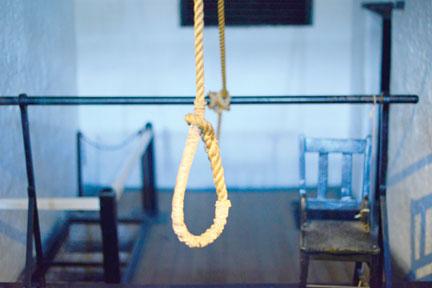You are here
Conference explores mixed opinions towards issue of capital punishment in Jordan
By Camille Dupire - Oct 10,2017 - Last updated at Oct 10,2017

Photo courtesy of pixabay.com
AMMAN — “The choice related to death penalty should be made with a cold mind, not a hot heart,” said Nizam Assaf, director of the Amman Centre for Human Rights Studies at a conference held at the French Institute (IFJ) on Monday.
The remarks came during a symposium organised by the Jordanian Coalition Against the Death Penalty (JCADP), in cooperation with the IFJ, under the title “The death penalty in Jordan: Between reasons of retention and attempts to abolish”.
Assaf, who is also a member of the JCADP steering committee, spoke about the issue of capital punishment in the Kingdom,along with four experts from the judiciary, religious and legal fields.
“Death penalty is not the proper way to solve the criminal issue. For any society in the world, the challenge is to find the political, social, cultural and economic roots of the problem,” he explained, noting that “in Jordan, our biggest challenge is the lack of equality between all citizens”.
“If you look at statistics, most people on the death row in Jordan come from the poorer segments of society,” Assef claimed, adding that “powerful and rich people manage to escape the capital sentence through economic and political connections”.
Established in 2006 to abolish the death penalty from the Jordanian legislation, the JCADP calls for the adoption of comprehensive solutions to the causes of crime, extremism and terrorism, in accordance with modern mechanisms to prevent and reduce crime, according to its website.
“There is no proof that death penalty helps reduce the number of crimes; it is simply the ‘easy way’ to avoid solving the core reasons behind the problem,” said Assaf , calling for raising awareness among various segments of society on “the right way to fight crime”.
The discussion explored the mixed opinions towards the issue of capital punishment in Jordan, which has been under debate between activists who oppose the death penalty and officials and lawyers who believe it should stay.
For MP Mustafa Yaghi, the death penalty is unlikely to be abolished “anytime soon”. He referred to the parliamentarians’ reluctance to change the law, citing a huge pressure from the public opinion on the matter.
“I am not optimistic about an upcoming abolishment of the punishment, as most of my colleagues under the Dome follow their constituency’s popular view which is widely in favour of the death penalty,” the parliamentarian said.
Judge Mohammed Al Tarawneh, who is also President of the Arab Coalition Against the Death Penalty, reviewed the judiciary aspect pertaining to the issue, outlining the legal provisions granted to those who face punishment.
For his part, religious expert Hamdi Murad said: “People have distorted the religious vision towards the death penalty, claiming that it is widely allowed in Islam. In reality, Sharia constrains it to extremely limited cases,” stressing that lawmakers should avoid the ultimate punishment in most cases, or when there is doubt.
“The Islamic law has always preserved human dignity and the right to life and liberty,” he said, stressing that “it is a religion of peace”.
Calling for a coordinated action to protect the right to life, Assaf concluded: “People calling for the death penalty only use their feeling of anger.They base their decision on a psychological aspect that does not have any solid socio-economic basis.”
Between 2006 and 2014, Jordan maintained an eight-year moratorium on the death penalty, which ended in December 2014 when authorities executed 11 individuals for murder.
Article 93 of the Constitution reads that “no death sentence may be carried out unless ratified by the King. Every such sentence shall be submitted to him by the Council of Ministers along with the council’s view on it”.
Related Articles
UN High Commissioner for Human Rights HH Prince Zeid has called on all countries that still apply the death penalty to abolish capital punishment.
Human Rights Watch (HRW) on Sunday criticised the government for executing 11 convicts.
Robert Badinter, former French justice minister and anti-death penalty activist, has urged Jordan to vote against capital punishment at the UN General Assembly this fall.

















